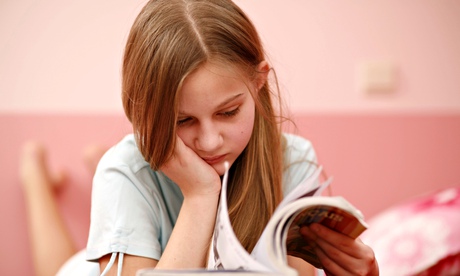
Despite my 10-year-old daughter being a proficient reader, with, I’m told, a reading age beyond her years, I can’t get her to pick up a book.
She has access to a varied range of books at home, as well as a Kindle. However, she sees reading as a chore and says it is boring and pointless. I’ve lost track of the number of authors, subjects (fiction and non-fiction), magazines and newspapers we’ve tried. She is the proverbial horse that won’t drink.
Matters are probably exacerbated by the fact the rest of the family are avid readers. I would love her to experience the pleasure of a good book, while at the same time broadening her vocabulary and creativity.
Your daughter sounds as if she is already good at reading and also has a mind of her own. That’s something to celebrate. Books are not the only way to read, and surely one of the great pleasures is to be able to pick what we do read? I spoke to Irene Picton from the Young Readers Programme at the National Literacy Trust (literacytrust.org.uk) – incidentally, Picton didn’t learn to read till she was seven. “The good thing is that it doesn’t sound as if your daughter is avoiding reading because she is finding it difficult,” Picton points out, and this is important.
But she is choosing, for whatever reason, not to read – at least not what you’d like. We wonder how much choice your daughter has in choosing, rather than just from a selection you present her with?
There is some evidence that when written text first came out, it was regarded with suspicion. Before this, knowledge was passed on orally and memorised; “real knowledge” was seen as only what you kept in your head. There was some snobbery about information that was written down to begin with. I mention this because I bet your daughter is reading something – it may just not be what you think is valid. Or she may be getting her information from other sources such as radio, videos or television.
If you are a big family of readers she may want to do things her own way and be different. She may be overwhelmed by the choices you have made for her or may not like anything you have chosen for her.
The first thing I’d like you to do is relax. The second thing? I’d like you to read a book, recommended by Picton: The Rights of the Reader by Daniel Pennac. Some of those rights are the right of the reader not to read; the right not to finish; the right to skip; and the right to read anything.
You don’t mention what your daughter’s interests are and how she gets further information about things she is into. And this may be a way in. She may like cookery books or books about Lego/her favourite game/band. Picton also suggested that if your daughter has enjoyed a film recently, she may be interested in reading a book about it. But the last thing I want you to do, just for now, is put her under more pressure to read. Forcing someone to read is completely counterproductive.
Let her see you reading, read out bits you find funny or interesting, cut out bits you think may interest her from magazines or newspapers (short ones) – but let your daughter choose to read them without any badgering from you. If necessary, back off altogether. Try to remember that sometimes, the most proactive thing we can do is nothing at all.
I don’t want any of this to seem like I don’t think reading is important – it is. But once we can read well, it’s important we have ownership of how, when and what we read. Your daughter may have to do a lot of reading at school (some of the words she uses are telling: “chore”, “boring”, etc). She will have to read set texts when she studies for formal exams later – presuming she takes them. I think there is a danger she could switch off from reading if it’s too forced now.
Picton thinks it is great you have been able to have a conversation with your child about what she does think, by the way. But I wonder if your child feels a bit nagged by good intentions? (Of course, I never do this to my own children.)
There is some evidence that children who are able to read autonomously and choose their reading material, attain levels that are expected of them or even higher. And this certainly seems to have been the case so far with your daughter, doesn’t it?
Also, remember that vocabulary can be learned by hearing it. That’s how I learned most of mine.
Your problems solved
Contact Annalisa Barbieri, The Guardian, Kings Place, 90 York Way, London N1 9GU or email annalisa.barbieri@mac.com. Annalisa regrets she cannot enter into personal correspondence.
Follow Annalisa on Twitter @AnnalisaB

